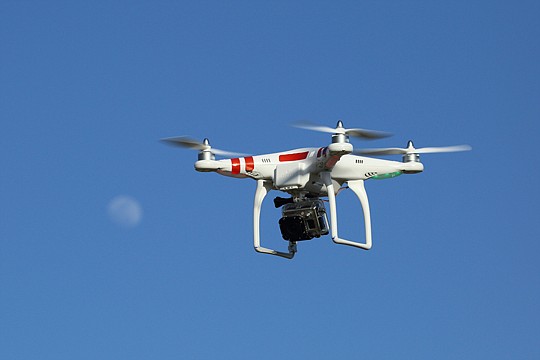
By Carole Hawkins, [email protected]
Using drones to photograph aerial shots of for-sale properties just got a little more confusing.
Gov. Rick Scott signed into law the Surveillance by a Drone Act (SB 766). The measure makes it illegal for anyone to use drones for photographing or recording images of people or their property from the air without written consent. It grants an exemption to state-licensed businesses, though.
The exemption helps Realtors.
But it doesn’t make it legal for them to use drones. If anything, the law makes it harder.
The Federal Aviation Administration already, in the absence of specific rules, considers small drones to be illegal for commercial use without a waiver. It is currently developing rules to allow them to be used legally.
The Florida law adds another layer to rules that protect privacy.
“The FAA is really going to say whether or not you can use a drone,” said Zachary Ludens, a Miami attorney with Carlton Fields Jorden Burt. “The state restriction is about whom you can capture images of.”
For companies that want to use drones to photograph real estate, the new law means operators have to make sure their drones capture only the particular unit they’re looking at, Ludens said.
If they’re hypothetically looking at 858 First St., they can’t also capture images of 856 First St. Otherwise, they could be sued for violating a person’s property rights.
Licensed businesses are exempt from the law, but the drone activity has to reasonably relate to what the license is for. Showing a home is one thing. Capturing the neighbors’ back yard or the neighbors in their living room is something else.
Other states besides Florida, as well as some municipalities, have begun passing drone regulations, said Chuck Tobin, a Washington, D.C. attorney for Holland & Knight. They include Texas, Illinois, North Carolina and Augusta, Ga., which this year banned drones during the Masters golf tournament.
But, Florida’s new law is one of the most restrictive.
That’s because the phrase, “reasonable expectation of privacy,” is used to describe the rights of people who are allowed to sue, said Tobin. It’s a phrase that can be interpreted very broadly.
The law also extends privacy rights to unoccupied property, something Tobin called a silly notion.
“Privacy is a personal right for people,” he said. “But under Florida’s law, if your property is unoccupied and filmed by a drone, you have the right to sue.”
Privacy is already protected by other laws, Tobin said. For example, it’s illegal to use a telephoto lens to photograph people on private property from a helicopter. Laws like Florida’s serve only to complicate drone regulation, he said.
But, Ludens said Florida has jurisdiction to pass such a law.
First Realtor gets drone waiver from federal officials
The Federal Aviation Administration has issued its first waiver to a Realtor to photograph property using a drone, the National Association of Realtors said.
Doug Trudeau of Arizona was granted a waiver Jan. 5 to use drones to create marketing videos of his listings. He spoke about the experience at the National Association of Realtors’ May Legislative Meetings & Trade Expo in Washington D.C., according to a news release.
Trudeau initially contacted an FAA attorney, but after a few weeks’ research completed the application without hiring his own lawyer.
The guidelines, he said, were fairly clear, but he did run into two glitches.
He should have logged his previous unmanned aircraft systems flying times and made sure his quadcopter was built in the U.S. The FAA will not register a drone that is registered by foreign governments, he said.
The process took 170 days. Trudeau said it’s easier now than it was a year ago and should go a lot faster for new applicants.
Jim Williams, manager of FAA’s UAS Integration Office, said the agency is committed to quickly finalizing federal rules for the commercial use of unmanned aircraft systems in national airspace.
Until then, Realtors can apply for a Section 333 waiver, which provides a limited-use permit that comes with safety restrictions.
The FAA has received more than 1,200 waiver applications, approved 311 and is on track to approve 20 to 40 waivers each week, he said.